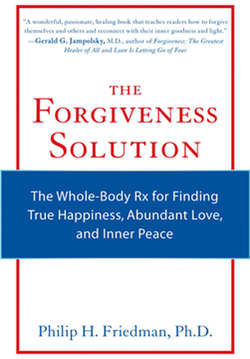Читать книгу The Forgiveness Solution - Philip H. Friedman - Страница 47
На сайте Литреса книга снята с продажи.
Shoulding on Ourselves
ОглавлениеIn the previous exercise, you wrote down your grievances, judgments, shoulds, and attack thoughts. Anytime we “should” on ourselves, we have emotionally backed expectations and obligations for ourselves based on some standard rules of conduct. For example, you might say to yourself: “I should earn X dollars a year” or “I should have gotten that promotion” or “I should make my spouse or mother happy all the time” or “I should be able to get an A in chemistry.” When we operate from these shoulds, we tend to judge ourselves harshly, and we fall below our own expectations and standards of conduct. Judging ourselves in this way is a form of attack. Anytime we “should” on another person, we are having expectations for that person based on some standard or rules of conduct. When the other person doesn't live up to that expectation or standard, we tend to judge them harshly. That judgment is also an “attack thought.” You can learn to identify these attack thoughts and let them go. There is nothing bad or wrong with having them. But when you learn to release them through the process of forgiveness, you will experience more love, peace, happiness, and joy in your life.
In addition, if you look closely, when another person with whom you are interacting is expressing attack thoughts and grievances—for example, expressing blame or judgment and getting angry—you will discover that underneath the anger, grievances, and attack thoughts are hurt and disappointment. Furthermore, if you look even more closely, you will discover that underneath the hurt and disappointment is fear. Fear, in turn, is a call for help and for love.
The fear operates on two levels. First, there is the other person's fear that you do not love, care, appreciate, or value them. Second is the fear that they are disconnected from the love within themselves. So hurt and disappointment cover up fear, and fear is a call for help and for love. Therefore, an “attacking person” is a fearful person calling for help and love. Moreover, when you are attacking or angry at another, you will discover the same process working within you; that is, you are experiencing hurt and disappointment, and that hurt and disappointment cover up fear. The fear within you is, in turn, calling for help and for love.
You can learn, with practice, to shift your perceptions and perspective to see that an attacking or critical person is a fearful person calling for help and for love. Learning to shift your perception and your attitudes is a key aspect of forgiveness. It is also a choice that you can make. Making that choice empowers you. Not making that choice disempowers you.
This is one of the most powerful decisions you can make and has the ability to transform the quality of your life. Part of the work of this book is to help you re-empower yourself by helping you return to your core self, that place that always exists within you, of love, peace, happiness, strength, and joy.
The next set of exercises, which I have adapted from A Course in Miracles and the work of Gerald Jampolsky, can help you release your shoulds.8, 9
